
redundant charities - an independent review by joel bird
Joel Bird wasn’t sure about Redundant Charities when he started reading it. He is an experienced International Development practitioner, Entrepreneur and Strategic advisor, and the founder of InDev - one of the fastest growing media offering in the global development sector. In this guest blog, he explains his concerns.

When is the right time to leave the charity you founded?
If a charity is to make itself redundant, then the foreign founder also has to make themselves redundant. As a foreign founder, when is the right time to leave?

Isn't it time we redefined success in charities?
Never in the history of humankind have we had more potential to act. There are more charities than ever, more people volunteering overseas, more crowdfunding campaigns to support at a click of a button.
And yet, amongst all of this good work, there is the underlying paradox of the entire charity sector. It is a commonly held belief that for a charity to exist, someone must remain suffering.

the myth of the heroic expat leader
On a plane from China, after a year of aid work, I started to feel nauseated (and no, this had nothing to do with the “meal” the airline had just served me).
I realised, with a sense of shame, that I had fallen into the trap of believing in a myth: The myth of the heroic expat leader.
Nothing could be further from the truth.

how the bigger-is-better mentality plagues the charity sector
In the non profit world, there’s an underlying logic that bigger is better. This is a notion that is rarely challenged.
Non-profits, including those whose very design prevents them from being effective at scale, love to boast about size. “We have headquarters in 25 countries! We have 1,000 staff in Malawi! We raised $108 million last year, up from $78 million the year before!”
Charities will often talk about scale, as if scale alone implies that their work is effective. But none of these boasts say anything about the effectiveness of a charity’s work.
